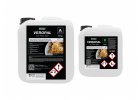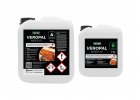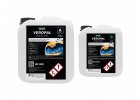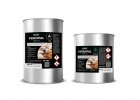Epoxy resins
Epoxy resins are usually two-component liquids that, when the components are mixed, begin to polymerize to form a hard, chemically resistant and dimensionally stable casting.
This is used in the manufacture of designer furniture, especially river tables made of epoxy resin, coffee and coffee tables, resin clocks, resin jewellery, as well as epoxy serving boards, epoxy lamps, epoxy paintings and other decorative products.
All epoxy resins are colorfast with compatible pigments and dyes depending on the desired effects.
This is used in the manufacture of designer furniture, especially river tables made of epoxy resin, coffee and coffee tables, resin clocks, resin jewellery, as well as epoxy serving boards, epoxy lamps, epoxy paintings and other decorative products.
All epoxy resins are colorfast with compatible pigments and dyes depending on the desired effects.
Depending on the application, epoxy casting resins are divided into:
- Casting resins - clear , low viscosity epoxies for epoxy creation, epoxy casting of tables, doors, headboards, clocks, lamps, jewelry, serving boards, etc.)
- Special (effect) resins - developed for special purposes (e.g. for paintings and geode art, for the technique of repeated casting in thin layers, high-strength for repairing deformed wood, fast for quick repairs in product machining, etc.)
- Penetrating resin - for sealing porous materials (wood) and thus eliminating bubbles during curing of the casting resin and for forming an adhesive bridge for further subsequent layers
- Pryskyřice pro povrchové vrstvy (coating, table top resin) - for the casting of the top layer or topping of wooden surfaces and their preservation (tables, coffee tables, clocks, etc.)
- Stabilizing resin - for strengthening and stabilizing decayed or unstabilized parts of wood, and for the production of stabilized wood for luxury products (knife blades, jewelry, golf club handles, gear levers of luxury cars, luxury pens, etc.)
- Floor resins - casting resins for designer cast floors and 3D clear floors
- Laminating resin - lower viscosity two-component epoxy systems for laminating composite materials, whether by hand lamination, coiling, RTM/RIM/SCRIMP or infusion.
Each epoxy resin has its own defined properties and one should always know before casting (look at the datasheet) what parameters and properties the resin has and whether it is suitable for the project. Among the most important parameters to be observed and on which the use of the resin depends are:
- food contact certification - important if you manufacture tables, tables, bowls etc., i.e. products that come into contact with food.
- UV resistance - defines the UV resistance of the resin. UV causes degradation = yellowing of any epoxy and this parameter tells us how long it takes for the resin to change shade. On the market there are epoxies yellowing to a deep yellow colour in a few months to epoxies changing their colour to a very fine yellowish shade in 5-6 years.
- gel time - defines the time it takes for the resin to polymerize enough to increase its density to a honey consistency. This is the time at which most pigment effects are formed.
- mixing ratio - it is the calculated ratio of resin (component A) to hardener (component B) that must be followed as closely as possible to ensure that the resin has the correct properties.
- processing time - time for which the resin is comfortable to work with.
- full curing time - the time after which the resin is cured, the epoxy is fully polymerized and ready for machining by grinding, milling, polishing, drilling, turning, etc.
- hardness in ShA units - determines how hard or tough the material is after curing. The ideal value is between 75-80ShA. Systems that are too hard are then more brittle and also unable to absorb the internal stresses caused by the working of the wood.
- maximum casting layer - what maximum layer can be cast at one time without risk of exothermic reaction (resin boiling)
- maximum casting volume - what maximum volume of resin can be mixed and cast at one time without risk of exothermic reaction of the resin
- glass transition temperature - determines the temperature resistance of the epoxy. It is the temperature at which the polymer changes from a hard glassy state to a flexible rubbery state. The process is reversible, i.e. the polymer hardens again when the temperature is lowered.
- epoxy shrinkage - defines the volume loss of the epoxy on curing. It is manifested by a drop in the cast level during curing and micro ripples on the surface of the cured casting
- Epoxy viscosity in mPa.s - determines how fluid the resin is. Casting resins have a lower viscosity, resins for various effects have a higher viscosity.
According to the size and type of casting, the resin types therefore differ and are divided into:
- casting resin for small castings such as jewellery, pens, small decorations, coasters, etc. This type of resin tends to be thin, fast in curing (on the order of hours to 1 day maximum), clear, harder and more brittle.
- casting resin for medium castings such as epoxy serving boards, small pieces of furniture, epoxy lamps, epoxy clocks, medium epoxy resin and wood coffee tables, etc. This type of resin tends to be thinner, slower in curing (2-3 days), however, with them it is possible to cast layers up to e.g. 5cm, they tend to be clear, hard.
- casting resin for large castings such as resin and wood dining tables, so called river tables, coffee tables, doors, bed headboards, epoxy vases, larger pieces of furniture, etc. These epoxy resins tend to be thin, slow to cure (3-5 days), can be cast in larger volumes (up to e.g. 50L), and in higher layers (e.g. 10-12cm).
- casting resin into thin layers (table top resin) to create a "glassy" surface of the wood and resin casting. This type of clear resin tends to be thin, relatively fast in curing, with good flow, minimal shrinkage and good surface resistance.
- artistic casting resins for creating epoxy paintings, geode art, various effects, etc. Resins of this type are dense, relatively fast in curing, clear, with minimal shrinkage.
.png)










